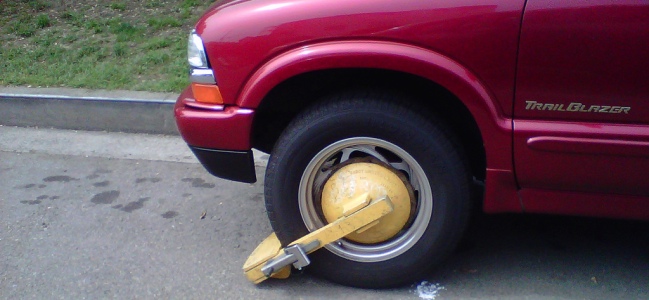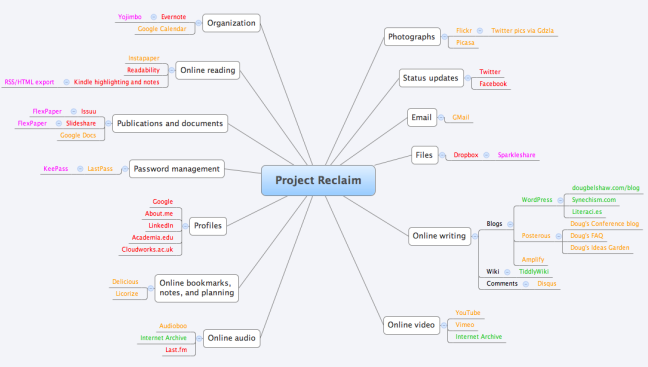Project Reclaim: or, how I learned to start worrying and love my data.

A few days ago, via Stephen Downes, I came across Project Reclaim, an attempt by Boone Gorges to ‘reclaim’ his data from the multiple silos he’s been putting them in. He’s talking about those places where it’s easy to get data into but not so easy to get them out of: Facebook, YouTube, Twitter… the list goes on. I was in the right frame of mind to take action after listening to Jason Scott be interviewed recently about the importance of digital heritage.
To be clear: none of what follows is about getting a warm fuzzy feeling from being more ‘open’. It’s everything to do with having access to my data when I’m the same age as my parents. This stuff is important.
Eventually, I’d like to be running open everything, but the first step is to have control of my data. I certainly can’t trust Facebook to host my data, but that’s not to say it can’t be an output – a place where data from other places is mirrored.
The first thing I decided to do was to map as many places where I store things online. I highlighted those services in green that are based on Open Source technologies. Those in orange are services where it’s reasonably straightforward to get your data out. Those in red are those where it’s difficult to download and export your data.

Over the rest of 2011 I’m going to be trying to make that mindmap greener. You can see that I’ve started to add (in pink) alternative services. I may have mis-coloured some elements (Dropbox should be orange, for example) – but the idea is sound.
Where am I going to start? I’m going to invest in Linode which means I’ll be able to host things like Sparkleshare (to replace Dropbox) and FlexPaper to replace SlideShare and Issuu. I’m not so concerned with the Google-based stuff at the moment as their committed (at the moment) to making exporting your data fairly painless – but I wish I could bulk-download my YouTube videos…
Image CC BY ecastro

Why invest in Linode? Why not your own server?
Hi Doug,
It should be possible to d/l youtube in bulk, there is an api to grab the list of your videos and a few scripts that download the video for example http://rg3.github.com/youtube-dl/ which worked well for me.
Great! Thanks for letting me know, John. :-)
I research and speak about digital legacy issues and this is a great approach for people to take. The problem is, your knowledge and expertise of how and where data is stored, and what you need to do to move it around, is not representative of the “average” person. The problem for them is simply understanding the issue of access and ownership. When simple to use, all-in-one tools for data management are in place, the “average” user will have a much easier time of it. I’m interested in how you progress.
I agree and, given that I’m writing my thesis on the concept of ‘digital literacies’ I can’t help but think that there’s an element of that at work here.
http://dougbelshaw.com/thesis
Well worth the time and thought – ‘this stuff IS important’.
Tony Hirst has blogged about this in terms of HE policy (http://blog.ouseful.info/2010/07/01/data-portability-policies-in-heis/) and the value of academic online identities and who ‘owns’ such data – the patterns of behaviour are worth as much as the data itself – this is what Google gets… (sorry can’t find the link atm).I am positive that there are many people (like myself) waiting for this to resolve into some sort of regularised pattern/system/meme/thing/behaviour.
Basically: the internet is a scale free topology (big network with no essential, hierarchical structure). Structure is emergent – allowing entities such as Facebook / Google to rise (and inevitably fall). Perhaps identities simply parallel this and grow / die as needed to meet the emergent structures?
Or perhaps online identities will BE the next nodes in the network – people will outlast the Googles and Yahoo!s of the world (?).
Looking forward to seeing where this goes and good luck with getting it all back…